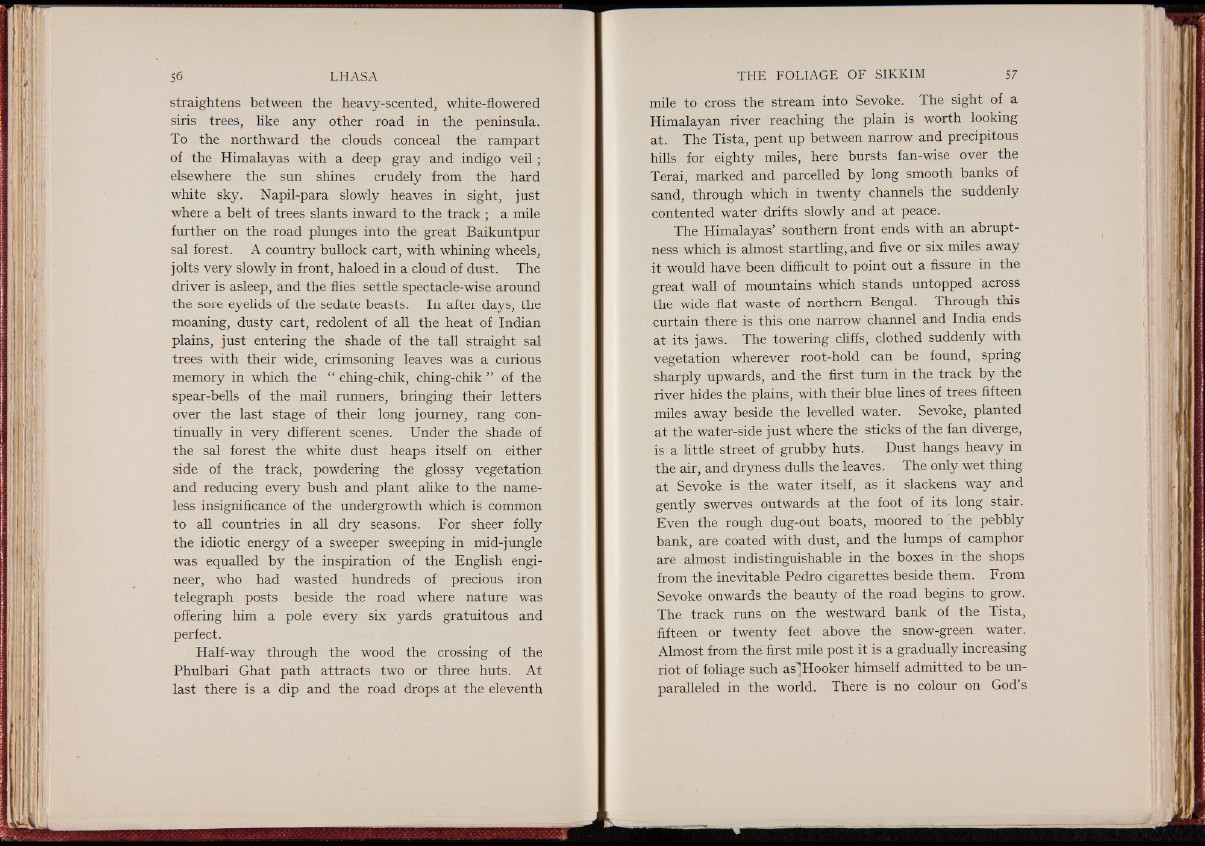
straightens between the heavy-scented, white-flowered
siris trees, like any other road in the peninsula.
To the northward the clouds conceal the rampart
of the Himalayas with a deep gray and indigo v e il;
elsewhere the sun shines crudely from the hard
white sky. Napil-para slowly heaves in sight, just
where a belt of trees slants inward to the track ; a mile
further on the road plunges into the great Baikuntpur
sal forest. A country bullock cart, with whining wheels,
jolts very slowly in front, haloed in a cloud of dust. The
driver is asleep, and the flies settle spectacle-wise around
the sore eyelids of the sedate beasts. In after days, the
moaning, dusty cart, redolent of all the heat of Indian
plains, just entering the shade of the tall straight sal
trees with their wide, crimsoning leaves was a curious
memory in which the “ ching-chik, ching-chik ” of the
spear-bells of the mail runners, bringing their letters
over the last stage of their long journey, rang continually
in very different scenes. Under the shade of
the sal forest the white dust heaps itself on either
side of the track, powdering the glossy vegetation
and reducing every bush and plant alike to the nameless
insignificance of the undergrowth which is common
to all countries in all dry seasons. For sheer folly
the idiotic energy of a sweeper sweeping in mid-jungle
was equalled by the inspiration of the English engineer,
who had wasted hundreds of precious iron
telegraph posts beside the road where nature was
offering him a pole every six yards gratuitous and
perfect.
Half-way through the wood the crossing of the
Phulbari Ghat path attracts two or three huts. At
last there is a dip and the road drops at the eleventh
mile to cross the stream into Sevoke. The sight of a
Himalayan river reaching the plain is worth looking
at. The Tista, pent up between narrow and precipitous
hills for eighty miles, here bursts fan-wise over the
Terai, marked and parcelled by long smooth banks of
sand, through which in twenty channels the suddenly
contented water drifts slowly and at peace.
The Himalayas’ southern front ends with an abruptness
which is almost startling, and five or six miles away
it would have been difficult to point out a fissure in the
great wall of mountains which stands untopped across
the wide flat waste of northern Bengal. Through this
curtain there is this one narrow channel and India ends
at its jaws. The towering cliffs, clothed suddenly with
vegetation wherever root-hold can be found, spring
sharply upwards, and the first turn in the track by the
river hides the plains, with their blue fines of trees fifteen
miles away beside the levelled water. Sevoke, planted
at the water-side just where the sticks of the fan diverge,
is a little street of grubby huts. Dust hangs heavy in
the air, and dryness dulls the leaves. The only wet thing
at Sevoke is the water itself, as it slackens way and
gently swerves outwards at the foot of its long stair.
Even the rough dug-out boats, moored to the pebbly
bank, are coated with dust, and the lumps of camphor
are almost indistinguishable in the boxes in the shops
from the inevitable Pedro cigarettes beside them. From
Sevoke onwards the beauty of the road begins to grow.
The track runs on the westward bank of the Tista,
fifteen or twenty feet above the snow-green water.
Almost from the first mile post it is a gradually increasing
riot of foliage such as] Hooker himself admitted to be unparalleled
in the world. There is no colour on God’s